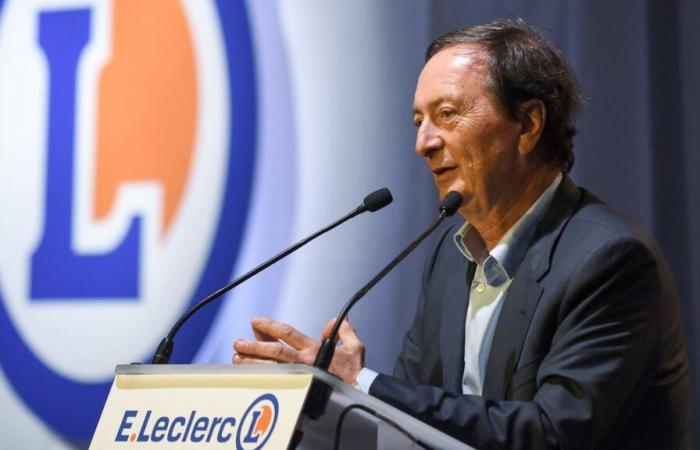The boss of E.Leclerc Michel-Édouard Leclerc was invited to LCI this Sunday to discuss the actions he is taking “on the ground” to defend the purchasing power of the French.
While the appointment of a new government in France still remains pending, uncertainty is gripping a large part of the economic world. Invited on LCI this Sunday, December 22, the boss of the E.Leclerc stores regretted a “lack of professionalism” on the part of the political class, not being able to agree on a budget for several months.
The latter is not opposed to the idea of entering government but claims to be “more useful on the ground”, particularly in the price battle with its distributor competitors such as Carrefour or Lidl.
“We need planning”
“We need planning,” says Michel-Édouard Leclerc, regretting small measures “that change nothing” such as the tax on sweet products, a decision deemed “unplanned” and only “intended to fill the budget.” “These small taxes stress the French about the fact that the political class is not taking matters into their own hands,” he laments.
Reference is also made to the Descrozaille law, which has been limiting promotions on hygiene and beauty products for more than a year, or the question of extending the use of meal vouchers for food shopping at the supermarket. . A file included on the Senate agenda on January 15.
On this last point, Michel-Édouard Leclerc calls for speeding up the agenda because it “will weigh on household budgets”. “In the National Assembly, we see purchasing power in a macro-economic way,” he accuses. “There is no calm place for discussion with sector professionals” such as food or housing.
“Putting the social elevator back on track”
Among the other pending files, the latter evokes the urgency of “getting the social elevator back on track” to allow the French to “earn their living by working”. Income policy should therefore be put back at the center of parliamentary debate to better remunerate work. A priority considered more important than that of “taxing the richest”.
Thus, instead of increasing the costs of businesses, the government would benefit, for example, from taking charge of “the arrival of the digital revolution” or even “decarbonization”. “I don’t find them professional, but I don’t want to fuel anti-parliamentarianism,” he declares while referring to the heated debates between parliamentarians and which appear “ridiculous on the international scene.”
Michel-Édouard Leclerc nevertheless shares the interest in public debate and opposition, just like those underway in his sector. Healthy competition which should not lead to inaction either. “I think that Emmanuel Macron made mistakes but he is not France, Mercosur for example involved several people and not just him,” he argues.
“Disengaged” French people
For their part, the French would have “disengaged from this Vaudeville [politique]”, which would also explain that the consumption forecast at the end of the year “will not be so bad”. On the other hand, consumption patterns have indeed changed and “precautionary saving” has become a norm.
A trend reinforced by the lack of political direction, particularly on the question of real estate investment or the acquisition of a new car. Michel-Édouard Leclerc speaks, for example, of uncertainty about “purchasing electric cars” which is pushing young people more to resort to rental.
In shopping carts, quality and precaution also take precedence, with an observed drop in the average basket. “We can treat ourselves for less,” explains Michel-Édouard Leclerc, citing “first-price ranges that are now nutri-scored and of better quality.”
Just like Alexandre Bompard in Le Parisien this Sunday, Michel-Édouard Leclerc promises that the “inflation rate will be flat”.
“The big speculative inflation has been put to rest! But it is not monetary policy that has brought down the price of pasta!”
But to achieve this, the latter does not intend to rely on future political decisions at national or European level. He intends to seek reductions within the framework of negotiations with wholesalers who buy from farmers. “We are going into combat mode to seek reductions from all the multinationals,” he says, citing multinationals like Procter & Gamble or Unilever who have “hidden”.






